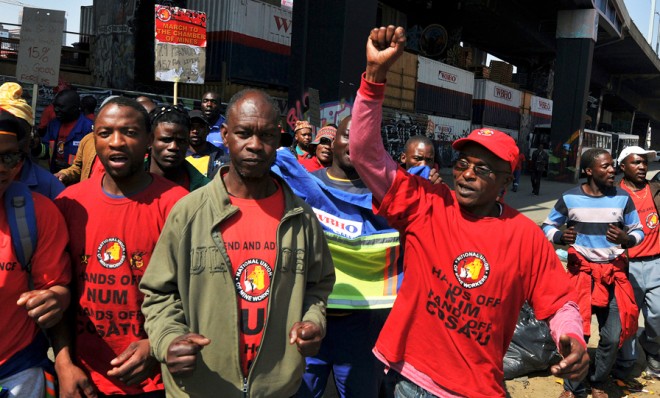Everything you need to know about the South African gold miners' strike
Africa's largest economy braces for the fallout

A free daily email with the biggest news stories of the day – and the best features from TheWeek.com
You are now subscribed
Your newsletter sign-up was successful
Some 90,000 South African gold miners are set to walk off the job, joining tens of thousands of other South African workers demanding higher pay. The strikes have emerged as a major threat to Africa's largest economy, and cast a spotlight on the country's uneven development in the post-apartheid era. Last year, a similar gold and platinum strike resulted in the deaths of 44 protesters, resulting in international criticism of the government of President Jacob Zuma.
Here's what's going on today:
What are the miners asking for?
The Week
Escape your echo chamber. Get the facts behind the news, plus analysis from multiple perspectives.

Sign up for The Week's Free Newsletters
From our morning news briefing to a weekly Good News Newsletter, get the best of The Week delivered directly to your inbox.
From our morning news briefing to a weekly Good News Newsletter, get the best of The Week delivered directly to your inbox.
A 60 percent pay increase, to 8,000 rand ($775) a month, from 5,000 rand.
Is that a big request?
Not according to Numbeo, a user-generated cost-of-living database, which pegs the median cost of transportation, rent, and utilities for the affected regions at about 4,950 rand a month. In other words, workers are making just barely enough to get by. "We want [the entry-level miners] to be able to earn a decent living. Many of them live in shacks," Lesiba Seshoka, a spokesman for National Union of Mineworkers, told Quartz.
What say their employers?
A free daily email with the biggest news stories of the day – and the best features from TheWeek.com
Following negotiations last week, the Chamber of Mines, which represents the major mining companies, made a final offer to increase wages 6 to 6.5 percent for 142,000 workers. Such a deal would land the workers between 5,300 and 5,325 rand a month.
Will the strikers prevail?
They have leverage. South Africa's gold industry has been losing strength lately, and mining companies don't have the cushion they once did to absorb losses from a strike.
Once the biggest gold producer in the world by far, South Africa is now ranked fifth, accounting for just six percent of the market. And while gold prices have been dropping globally, production has become more expensive in South Africa, as miners have had to dig deeper to access the resource.
But despite the changes, gold has remained the most important industry in the country. Last year's strike took a significant bite out of the economy, shaving about .5 percent off the country's GDP. This year, estimates say the mining industry could lose as much as $30 million each day while workers strike.
How will gold strikes impact the other strikes in South Africa?
South Africa's GDP has already lost .3 percentage points from other strikes this year, Zuma said on June 13.
"The gold strike will add to the pressure on South Africa's already vulnerable economy, coming on top of existing strikes in the construction and vehicle manufacturing industries," says Mike Wooldridge at BBC News.
Some 30,000 workers at car-manufacturing plants, including ones owned by Toyota and Volkswagen, have been striking since Aug. 19, and 90,000 workers employed at building companies have laid down their tools as well.
What are the strikers risking?
Violence, for one. During last year's strikes, 34 protesters were killed by police in a single day — the deadliest act of state violence since apartheid. And South African police have already said they're "fully prepared to maintain stability in the country and to ensure that safety prevails during any intended strike action," says Bloomberg.
Meanwhile, "mine owners are warning that the strike could lead to gold mines closing and thousands of jobs being lost, following a fall in the price of gold," says the BBC.
Carmel Lobello is the business editor at TheWeek.com. Previously, she was an editor at DeathandTaxesMag.com.
-
 Hyatt chair joins growing list of Epstein files losers
Hyatt chair joins growing list of Epstein files losersSpeed Read Thomas Pritzker stepped down as executive chair of the Hyatt Hotels Corporation over his ties with Jeffrey Epstein and Ghislaine Maxwell
-
 Political cartoons for February 17
Political cartoons for February 17Cartoons Tuesday’s political cartoons include a refreshing spritz of Pam, winter events, and more
-
 Alexei Navalny and Russia’s history of poisonings
Alexei Navalny and Russia’s history of poisoningsThe Explainer ‘Precise’ and ‘deniable’, the Kremlin’s use of poison to silence critics has become a ’geopolitical signature flourish’